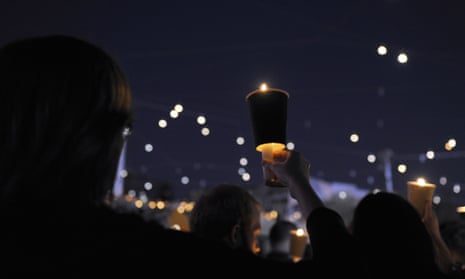“There were guys who wet themselves and shit their pants out of total fear,” said the man from Manus. “There was blood everywhere; faces kicked in, noses – it’s all head injuries. I just remember blood everywhere I looked. Blood everywhere.”
The nation holds its nose, averts its eyes. This isn’t us. Tony Abbott assured Andrew Bolt at the weekend, “We are by nature a generous and welcoming people.” But we will not be deterred by these regrettable events. We have to stop the boats. “And thank God the boats are stopping.”
Unexamined at the heart of the politics of the boats is the notion that if we are brutal enough, we need only be brutal once. So we convince ourselves every cruelty we’ve inflicted – beginning with sabotaging boats along the Malaysia coast under Malcolm Fraser – isn’t a reflection on us. It’s tactical.
We’re at it again. Underlying Abbott’s pitch is the promise that after we’ve defamed refugees as criminals, cut off any hope of them living here and shipped them off to violent camps and hopeless futures in the Pacific, the boats will stop and we can go back to being our true selves.
It’s a delusion. The boats always come back. Even after the Tampa and tow backs and the Pacific Solution made Australia notorious in the refugee world, the boats reappeared – a few in Howard’s last years and scores in Labor’s time.
That’s how it is: refugees are looking for somewhere to live. Closed doors are tested again and again. They have no choice. So if you want to keep refugees out, you have to keep slamming the door in their faces.
Labor flinched as so many boats made the crossing. Abbott attacked the government’s patriotism and competence, the polls turned south and Julia Gillard mandated a fresh regime of cruelty: no processing of claims, no right to work, then deportation to Manus and Nauru.
Refugees are patient. Pacific Solution Mark I proved a staging post. Some went mad in the process but all bar a handful of those Howard sent out to the islands a decade ago either went home or to New Zealand or to Australia.
Pacific Solution Mark II was not cruel enough to stop the boats until Kevin Rudd returned to power and mandated that refugees would settle out on those hostile islands for the rest of their lives.
The boats stopped. Scott Morrison counts the days: 76 so far without a refugee reaching Australia by boat. Those days justify the billions spent on Operation Sovereign Borders and the diplomatic gamble of towing refugees back to Indonesia in orange lifeboats. They put in perspective the slaughter on Manus.
But the door is opening a crack. Morrison returned from Port Moresby this week with no ironclad guarantee that the 1,300 detained on Manus would ever be allowed to settle in PNG. Nauru hasn’t made any watertight promises either.
Who will take these people if PNG and Nauru won’t? Some have gone and more will go home. Europe won’t rescue the rest. Nor will North America. New Zealand has already said no, not this time around.
Pacific Solution Mark II is starting to feel like another staging post. Generous and welcoming Australia may have to take them after all. But not swiftly. We’ll leave them in limbo for years like the last time and hope that all we learnt then about endless detention’s impact on people - violence, self-harm and mental collapse – will discourage refugees.
No doubt when the boats return – as they will – we’ll find fresh reserves of cruelty to draw on. It’s never been a problem in the past. Australia, reluctant at first and plagued by outbreaks of decency, has always proved up to the task in the end.
The miracle is that after nearly 40 years of this we’re still as confident as ever that once the latest brutal campaign is done, once the boats have stopped again, we can go back to being the decent people we thought we were. We don’t read it for what it is: a permanent regime of cruelty.
A long time ago we set the dial at brutal and we’ve kept it there. That’s hard to face. It goes against our deepest sense of ourselves. But stopping the boats is about us as well as them. The major parties, the Murdoch press and tabloid radio is urging the nation not to lose its resolve. But while a slew of inquires ask what happened on Manus it might be time for Australians to start asking: what have we become?
